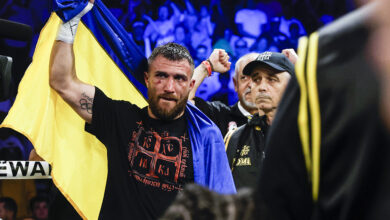How motorsport is slowly changing for LGBTQ+ staff

In 2021, as increasing numbers of sportspeople are feeling comfortable about coming out, there are still people working in Formula 1 and other series who feel they cannot be honest about their sexuality and gender identity, even after 25 to 30 years of working in motorsport.
Several officials inside racing organisations say that despite drivers like Lewis Hamilton and Sebastian Vettel, both of whom have worn Pride colours at various races this season, being supportive allies, many queer people in team garages feel more comfortable staying closeted.
Matt Bishop, Aston Martin’s chief communications officer, has worked in motorsport for over 25 years, and as, he says, “the only [out] gay in the F1 village” in the 1990s, he has often fielded messages from people struggling to come out to colleagues after years in the industry.
“When they arrived [in F1], they assumed they had to be [closeted] because they were, you know, mechanics sharing rooms with other mechanics and the world wasn’t ready for them to come out,” Bishop tells ESPN.
“Now, let’s say they’ve worked for Williams or McLaren or whomever for 30 years, and they perhaps feel they want come out now, they may even be married to their male partner, but they don’t. Because they say, ‘I can’t come out now. Not after not being out for 30 years’.”
Krystina Emmanouilides, an ambassador for Racing Pride working for Alfa Romeo Racing, who is a lesbian, agrees. She says she knows people in F1 teams who are part of the LGBTQ+ community and still don’t feel comfortable about coming out.
“I know people who have left F1 because of various problems with discrimination that they face, sexism that they face, and not just on the sly but blatantly as well,” she tells ESPN.
“And then there are some who have come back to motorsport years later, thinking perhaps things may have changed, even in different teams, but finding that same [negative] experience.”
Richard Morris, a gay racing driver and founder of Racing Pride — global motorsport’s LGBTQ+ awareness organisation — describes how a simple use of language can cause some people to feel like coming out is not an option.
Earlier in his career, before he came out publicly, it was a conversation with his soon-to-be chief mechanic during a seat fit when the topic of girlfriends came up.
“I didn’t feel like I could challenge that and say, ‘Actually, no, I have a boyfriend’. I just felt like I had to play along with it because I didn’t want to risk damaging that [new] relationship with this person,” Morris, who drove for CW Performance in the 2021 Britcar Endurance Championship, tells ESPN.
“I’ve had so many conversations when I’ve had to just drop out all the pronouns and say ‘my partner does this, they do that,’ I never use he/him. Because you’re afraid that if you say you’re gay, and they don’t support you, then they’re not going to give you that drive or they won’t treat you the same as your teammate.
“Automatically, you start hiding bits of your life and then that sets up these situations where you go to collect your trophy at the end of the season and you don’t bring your partner even though everyone else brings theirs.”
Racing Pride, founded in 2018, was inspired by football’s Rainbow Laces campaign, and, in conjunction with LGBTQ+ awareness group Stonewall, aims to promote inclusivity, encourage awareness, and educate people on how to make the sport accessible to all. Its ambassadors include trans endurance driver Charlie Martin, trans rally driver Rowena Purdy, and Sky Sports journalist Jon Holmes.
READ: 17 LGBTQ+ athletes share their coming out journeys
Morris says: “It’s not that people in motorsport weren’t open to including more people, it’s that they didn’t know how to have those conversations, they were just awkward conversations that never happened.
“But that can feel quite isolating if you are from a minority group. And then when you hear people using unhelpful words, even if they’re not aimed at you, it just reinforces that idea that you won’t be included.”
For a sport which has historically been a white, hetero-masculine environment, those who belong to a minority group can find it tricky to find their place and feel comfortable.
Bishop, a Racing Pride ambassador, says: “Anybody who didn’t fit into that demographic bubble was very much an outlier.
“So I did encounter some homophobia. Obviously, you don’t know how much you really encounter because some of it goes on behind your back…”
He then recalls an incident a number of years ago when a driver he did not name called him a “fat f—-t” directly.
“I have lost weight since but my attraction to males has not waned,” he adds, self-deprecatingly.
“I did object to it, not from a factual point of view but from an impoliteness point of view… The funny thing is, it actually worked out worse for him, because anybody hearing it didn’t think any of less of me, but they sure thought less of him.”
Emmanouilides, an Australian with Greek heritage, did not come out to her family until after university, but to everyone else she has always been open about being gay.
“My main goal is just to educate others,” she says. “To be a woman, to be a gay woman, in F1 is important to me, not just because I want to be accessible to others and be that visibility, but to help other people who want to be in my position.
“Everyone in F1 is there because they’re passionate about motorsports so there’s always a common bond, and I think it’s really important to show that.
“Yes, you can be a woman in a male-dominated industry, or a gay man or non-binary, transgender, but, at the end of the day, everyone loves motorsport and I think that’s really important to focus on.”
F1 is perhaps a symptom and not the disease in the sense that discrimination is a greater societal problem. However, Emmanouilides argues that a sport’s progress with regards to diversity and inclusion can be seen in the audience’s behaviour.
She offers an example of a woman she knows who went to the Austrian Grand Prix in July: “She was walking through the grandstand and she was shouted at by a group of men, and one of them shouted out, ‘Hey love, your seat’s in my lap’.
“The fact that this is happening at races shows there’s still a lot more to do from F1 in general to improve diversity because, clearly, as it stands now if you’re attracting this kind of fanbase it’s only a reflection of where the sport currently is.”
She adds: “Until you have a more diverse range of people, not only within an organisation or a structure, but also in higher positions, then we’ll never have those voices heard in the spaces that decisions are made.”
2:11
Alfa Romeo engineer and Racing Pride ambassador Krystina Emmanouilides feels more can be done by top sports authorities to promote inclusive environments.
Real progress goes deeper than putting stickers on racing cars, though. Vettel and his Aston Martin team have been championing Pride across the season, with Vettel’s rainbow t-shirt and attire at the Hungarian Grand Prix worn to protest the country’s anti-gay laws that were passed in June.
Emmanouilides argues that policies and contracts are where change can be the most effective in creating an inclusive sport and working environment.
If everybody knows what’s expected of them from the outset, they can feel comfortable enough to work at their best and know there is a structure in place to support them when it’s necessary.
“As a gay person, you don’t just come out one time. Every time you start a new job, or anytime you’re in a new environment, you have to come out again. Some people struggle, in this F1 environment, to come out even once,” she says.
“If you are uncertain whether you can come out ,or if you don’t know how people will react, you’re never going to be working to your highest quality.
“I think outlining [expectations] and setting up structures is the only way that we can ensure that these things [discrimination, unconscious bias] are not carried on through time … it’s about setting the tone.”
To set that tone, everyone has to be on-board. Sponsors, investors, race partners, host countries, all fund the sport and toeing the line could prove difficult on some occasions, such as the concerns for racing in countries with anti-gay laws.
For example, Qatar, which outlaws homosexuality, announced that rainbow flags would be allowed at the 2022 FIFA World Cup to respect “the difference in people’s cultures,” but gay citizens still live fearful lives.
Emmanouilides says she received mixed responses when discussing with some friends and colleagues around F1 about how they felt about going to Qatar for the recent Grand Prix there.
Some people said it made them uncomfortable, but that it would be more problematic for those still closeted to discuss concerns with their managers, for fear of losing their jobs.
“There aren’t many opportunities within the sport so if you don’t want to do it, there are a hundred other people lining up for your job, and this is where I think people are really afraid to speak up for what they believe in, and why it’s so important to have structures within HR,” she says.
What impact is Racing Pride making?
Morris says the purpose of the organisation was never about highlighting the sport’s problems with inclusivity. It was rather about showing that despite the historic masculine image, motorsport can be, and is for some, a welcome space.
He said: “The angle was always to be positive, and to show that there are LGBTQ+ people doing great things and having a fantastic time. The visible representation, we thought, was important. And then we also linked up with series and teams and organisations, to help us to carry that message across.”
It’s also not about encouraging people to come out if they don’t want to. “We don’t put that [pressure] onto anyone, but the purpose of having these ambassadors is really to harness that power of the collective,” he says.
“We hope that LGBTQ+ people throughout the sport can look at the range of ambassadors that we have, and can see someone that they identify with, and relate to.”
The same goes for fans too, says Emmanouilides: “Imagine how many gay people were watching when Aston Martin had the rainbow on their car, perhaps unsure about whether there was a place for them. To see a team outwardly supporting you, that is just going to make a huge difference.”
So far, it seems to be working. Morris has already had a number of messages of support from people who found the awareness inspiring and no longer feel like the ‘only one’, or found the courage to confide in their colleagues.
“People have told me, ‘I’ve just told the other people in my marshal post for the first time ever that I’m gay, and it’s been great and they’ve been completely accepting and it’s been wonderful’,” he said.
The visibility is spreading in other ways too. In June, Sarah Moore podiumed in the W Series season opener in Speilberg, Austria and became the first openly LGBTQ+ driver to stand on a podium during a Grand Prix weekend.
“I’m happy and more so for everyone else in the community than I am for myself because I just feel like I’ve done it for the [Racing Pride] team effectively,” Moore told ESPN.
“It put a big smile on my face and I have received so many messages and love on social media. It’s helped make a positive step in the right direction.”
W Series, the women-only racing series, has three openly gay drivers, while other top-level series like IndyCar, Formula One, Formula E, have none.
W Series advisory board chairman and former F1 driver David Coulthard mulled it over, telling ESPN: “What I would wager is … I think the whole attitude of women in motorsport [is that] they’ve had to overcome challenges that the men haven’t.
“They understand they are trailblazers, and they have been given an opportunity, in many cases when their careers were not moving forward, because they didn’t have the finance.
“We [W Series] are taking that [burden] away from them and allowing them to focus purely on the driving, and I think that openness allows them to be more [free] about whatever background they come from, sexual orientation, religion. W embraces all.”
“Maybe the traditional male sport is not as open as W [Series],” he adds. “W says if you are good enough, you are good enough, irrespective of who you are and where you come from.”
Will there ever be a point when Racing Pride isn’t needed? No, says Morris, because the present mission is to educate, spread awareness and get to a position where everyone feels accepted, included, and welcome to be themselves.
From there, he hopes the focus would shift to celebrating the existence of the LGBTQ+ community and the experiences they have, while the need to educate and push for diversity will fade away.




